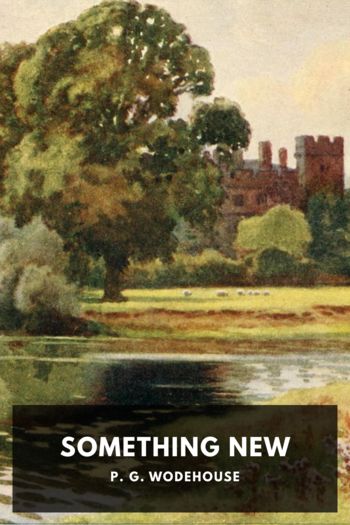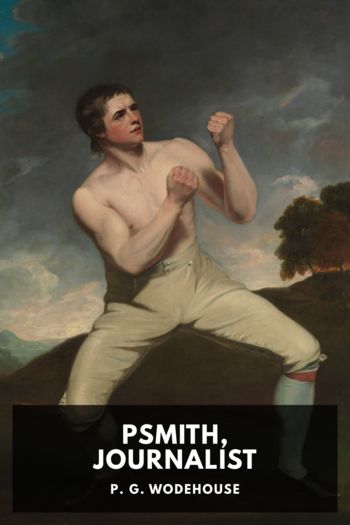Leave It to Psmith - P. G. Wodehouse (i wanna iguana read aloud .TXT) 📗

- Author: P. G. Wodehouse
Book online «Leave It to Psmith - P. G. Wodehouse (i wanna iguana read aloud .TXT) 📗». Author P. G. Wodehouse
And Edward Cootes, moving sombrely across the hall, made a sinister exit. The mood of cool reflection was still to come, when he would realise that, in his desire to administer what he would have described as a hot one, he had acted a little rashly in putting his enemy on his guard. All he was thinking now was that his brief sketch of the position of affairs would have the effect of diminishing Psmith’s complacency a trifle. He had, he flattered himself, slipped over something that could be classed as a jolt.
Nor was he unjustified in this view. The aspect of the matter on which he had touched was one that had not previously presented itself to Psmith: and, musing on it as he resettled himself in his chair, he could see that it afforded food for thought. As regarded the disposal of the necklace, should it ever come into his possession, he had formed no definite plan. He had assumed that he would conceal it somewhere until the first excitement of the chase slackened, and it was only now that he realised the difficulty of finding a suitable hiding-place outside his bedroom. Yes, it was certainly a matter on which, as Mr. Cootes had suggested, he would do well to chew. For ten minutes, accordingly, he did so. And—it being practically impossible to keep a good man down—at the end of that period he was rewarded with an idea. He rose from his chair and pressed the bell.
“Ah, Beach,” he said affably, as the green baize door swung open, “I must apologise once more for troubling you. I keep ringing, don’t I?”
“No trouble at all, sir,” responded the butler paternally. “But if you were ringing to summon your personal attendant, I fear he is not immediately available. He left me somewhat abruptly a few moments ago. I was not aware that you would be requiring his services until the dressing-gong sounded, or I would have detained him.”
“Never mind. It was you I wished to see. Beach,” said Psmith, “I am concerned about you. I learn from my man that the lining of your stomach is not all it should be.”
“That is true, sir,” replied Beach, an excited gleam coming into his dull eyes. He shivered slightly, as might a warhorse at the sound of the bugle. “I do have trouble with the lining of my stomach.”
“Every stomach has a silver lining.”
“Sir?”
“I said, tell me all about it.”
“Well, really, sir …” said Beach wistfully.
“To please me,” urged Psmith.
“Well, sir, it is extremely kind of you to take an interest. It generally starts with a dull shooting pain on the right side of the abdomen from twenty minutes to half an hour after the conclusion of a meal. The symptoms …”
There was nothing but courteous sympathy in Psmith’s gaze as he listened to what sounded like an eyewitness’s account of the San Francisco earthquake, but inwardly he was wishing that his companion could see his way to making it a bit briefer and snappier. However, all things come to an end. Even the weariest river winds somewhere to the sea. With a moving period, the butler finally concluded his narrative.
“Parks’ Pepsinine,” said Psmith promptly.
“Sir?”
“That’s what you want. Parks’ Pepsinine. It would set you right in no time.”
“I will make a note of the name, sir. The specific has not come to my notice until now. And, if I may say so,” added Beach, with a glassy but adoring look at his benefactor, “I should like to express my gratitude for your kindness.”
“Not at all, Beach, not at all. Oh, Beach,” he said, as the other started to manoeuvre towards the door, “I’ve just remembered. There was something else I wanted to talk to you about.”
“Yes, sir?”
“I thought it might be as well to speak to you about it before approaching Lady Constance. The fact is, Beach, I am feeling cramped.”
“Indeed, sir? I forgot to mention that one of the symptoms from which I suffer is a sharp cramp.”
“Too bad. But let us, if you do not mind, shelve for the moment the subject of your interior organism and its ailments. When I say I am feeling cramped, I mean spiritually. Have you ever written poetry, Beach?”
“No, sir.”
“Ah! Then it may be a little difficult for you to understand my feelings. My trouble is this. Out in Canada, Beach, I grew accustomed to doing my work in the most solitary surroundings. You remember that passage in my Songs of Squalor which begins ‘Across the pale parabola of Joy …’?”
“I fear, sir …”
“You missed it? Tough luck. Try to get hold of it some time. It’s a bird. Well, that passage was written in a lonely hut on the banks of the Saskatchewan, miles away from human habitation. I am like that, Beach. I need the stimulus of the great open spaces. When I am surrounded by my fellows, inspiration slackens and dies. You know how it is when there are people about. Just as you are starting in to write a nifty, someone comes and sits down on the desk and begins talking about himself. Every time you get going nicely, in barges some alien influence and the Muse goes blooey. You see what I mean?”
“Yes, sir,” said Beach, gaping slightly.
“Well, that is why for a man like me existence in Blandings Castle has its drawbacks. I have got to get a place where I can be alone, Beach—alone with my dreams and visions. Some little eyrie perched on the cliffs of Time. … In other words, do you know of an empty cottage somewhere on the estate where I could betake myself when in the mood and swing a nib without any possibility of being interrupted?”
“A little cottage, sir?”
“A little cottage. With honeysuckle over the door, and Old Mister Moon climbing up above the trees.





Comments (0)